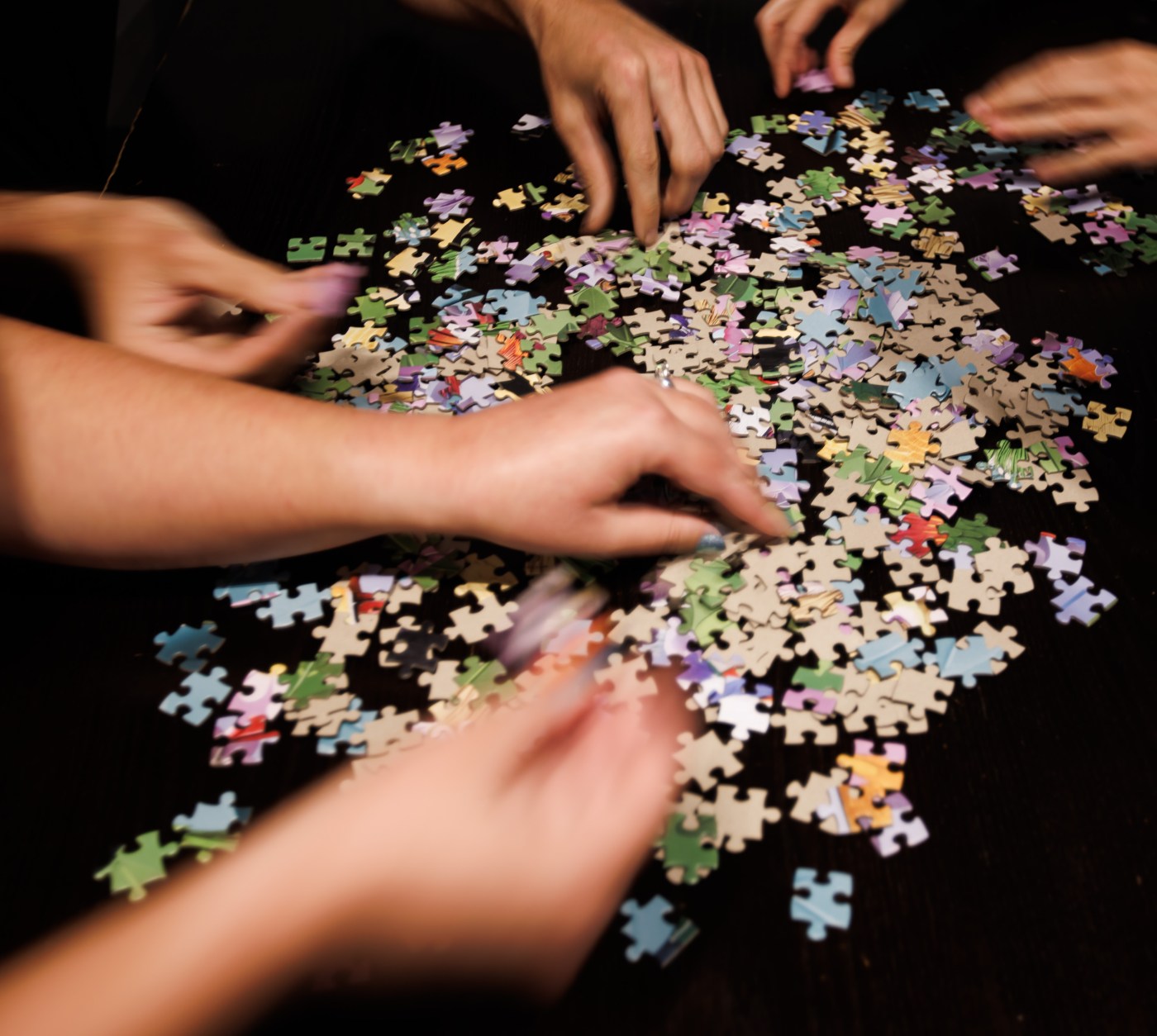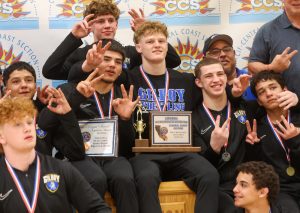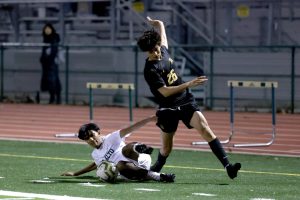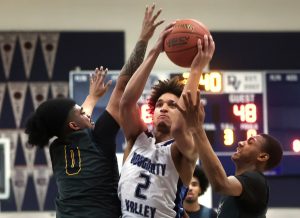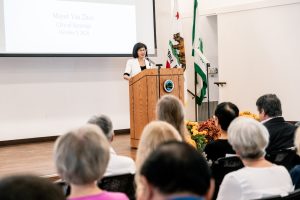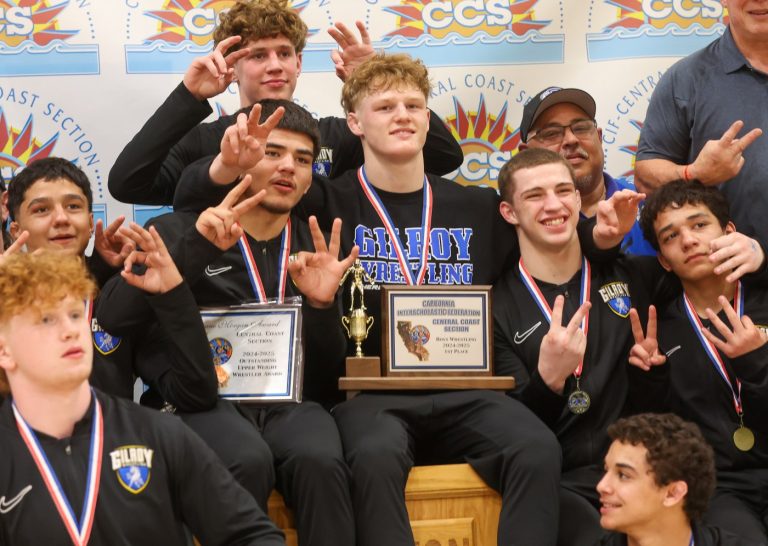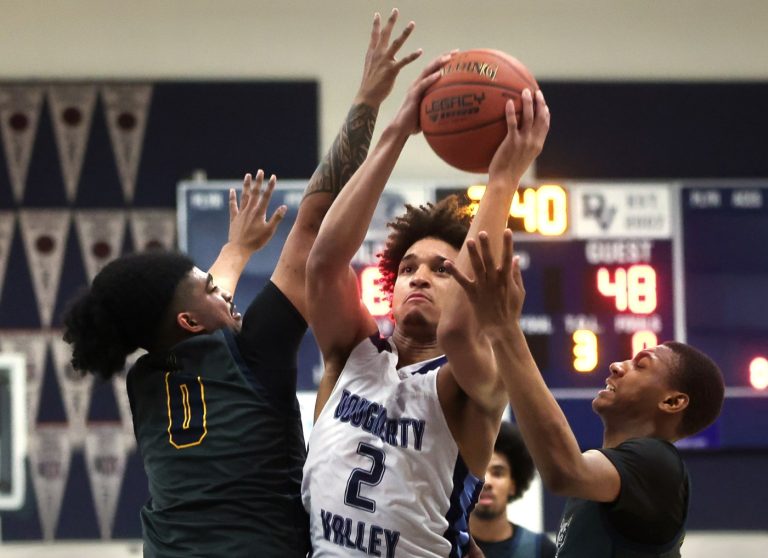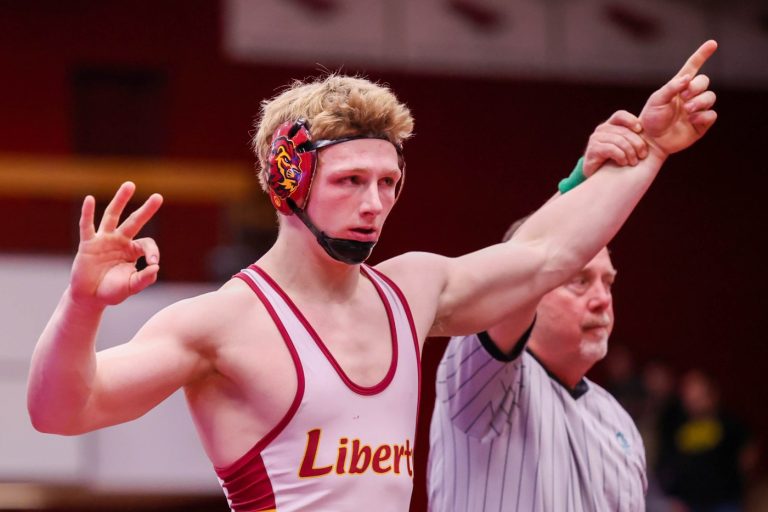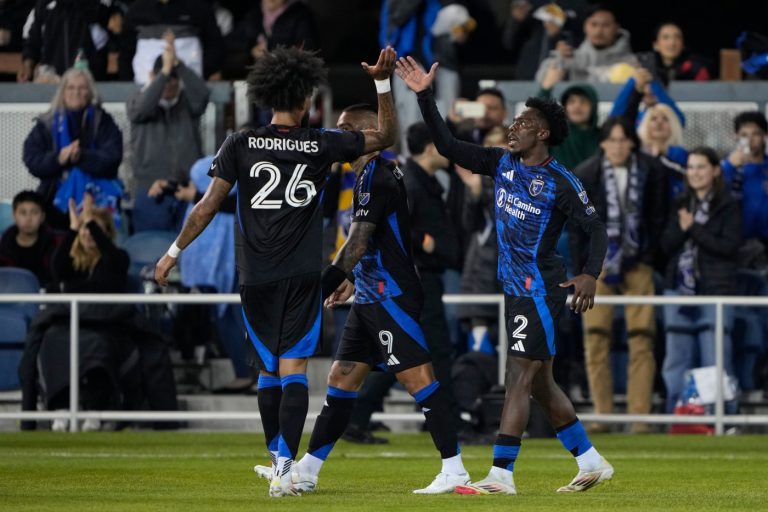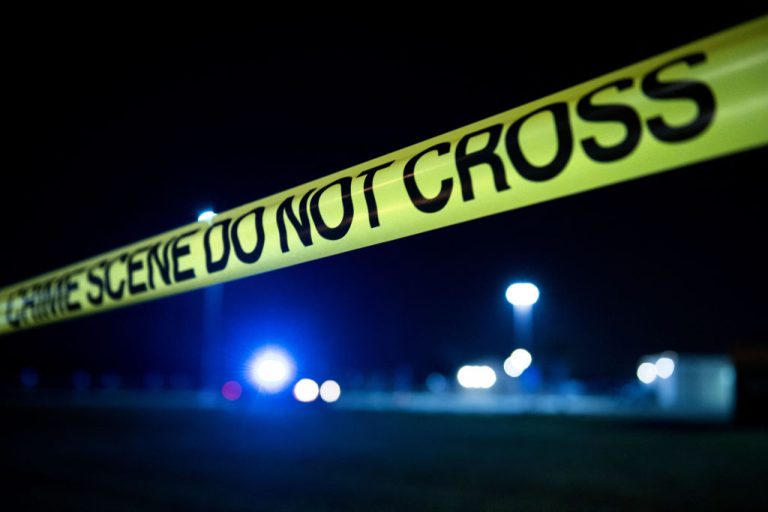They gathered by the hundreds in the medieval city of Valladolid last month, but not for the nightlife or museums. Becca Taylor, Andrea Peng and their fellow jigsaw enthusiasts were there to test their mettle against some of the globe’s fastest competitive puzzle solvers at the World Jigsaw Puzzle Championships.
For five days, players filled the Spanish city’s Cúpula del Milenio or Millennium Dome, flipping, sorting and placing jigsaw pieces with dizzying speed. They competed as individuals, as pairs and in teams of four to complete puzzles that ranged from 500-piecers to multiple thousands.
US’ Busy Birdies team celebrates their victory in the final of the fourth edition of the World Jigsaw Puzzle Championship in Valladolid on Sept. 22, 2024. (Photo by CESAR MANSO / AFP) (Photo by CESAR MANSO/AFP via Getty Images)
And when the puzzle dust settled, the Busy Birdies — Redwood City resident Taylor, San Francisco’s Peng and Washington sisters Cathy and Jeanne Roiter — had won the first place trophy, completing two 1,000-piece puzzles in 1 hour, 16 minutes and 7 seconds. Peng also placed third in the pairs category with teammate Kelly Walter of Arizona. The top-ranked U.S. pair mastered a 1,000-piece puzzle in just over 49 minutes.
Perhaps you, like so many of us, spent lockdown hunkered over a colorful Ravensburger puzzle or two (or 12). Maybe you graduated from the world of 500-piece landscapes (or unicorns) to four-digit puzzles. But chances are good, you didn’t do it with a timer ticking. Even world champs Peng and Taylor encountered speed puzzling only relatively recently.
The winning team at the World Jigsaw Puzzle Championship in Valladolid, Spain, was the Busy Birdies, made up of Becca Taylor of Redwood City, Andrea Peng of San Francisco, and sisters Cathy and Jeanne Roiter of Washington state. (Courtesy Susanne Riehemann)
In 2022, Taylor was a casual, albeit lifelong, jigsaw enthusiast who enjoyed tackling 2,000-piece puzzles featuring the graphic art of M.C. Escher — as a hobby, not a way of life. She discovered its competitive iteration, speed puzzling, later that year at a wood puzzle race held in Half Moon Bay.
Participants compete in the fourth edition of the World Jigsaw Puzzle Championship in Valladolid on Sept. 22, 2024. (Photo by CESAR MANSO / AFP) (Photo by CESAR MANSO/AFP via Getty Images) *** BESTPIX ***
Related Articles
Review: ‘Warhammer 40,000: Space Marine 2’ leverages a dark sci-fi lore with layered gameplay
Steelseries Arctis GameBuds bring AirPod-like features into gaming realm
Video game maker Activision Blizzard laying off hundreds of California workers
How the PlayStation 5 Pro improves the graphics of current games
A board game for birders: How Wingspan used stunning bird illustrations to sell millions of copies
The discovery set her on a journey, bringing her into contact with a global community of jigsaw junkies and inspiring her own Rocky-style training montage — if you replace the staircase reps with puzzle races against the clock. To prepare for the World Championships, she began completing multiple puzzles a day — logging hours at the table before and after work.
“At the height of training this summer, I’d do one to two puzzles early in the morning, sometimes one at lunch break, if I had enough time, and three to four in the evenings,” says Taylor who runs Stanford’s Distinguished Career Institute, a program for older adults returning to school.
Meanwhile, Peng was on her own parallel jigsaw journey. A biotech research contractor and mother of three daughters, Peng had always loved doing puzzles with her kids, especially during their teen years, when the pastime provided an outlet for companionship without forced conversation. During the lockdowns, the family went all-in on the hobby, tackling up to three 1,000-piece puzzles a day as a family.
About a year and a half ago, Peng went to a puzzle swap — a popular pursuit in the puzzling community because otherwise, the activity can get pricey fast — and learned about speed competitions.
From left, Linnea Shieh, Kelly Buhr, Doug Ellwanger and Becca Taylor compete in a team-based speed puzzling event in Sunnyvale, Calif., on Friday, Sept. 13, 2024. They took first place completing a 500-piece puzzle in 17 minutes and 5 seconds. (Dai Sugano/Bay Area News Group)
It wasn’t long before she discovered that she was good — and had the potential to be really good. Since then, she’s dialed in her speed puzzling techniques through a broad network of in-person and remote competitions.
Now, she can simply shake a paper-wrapped puzzle box and know what puzzle brand she’s likely to be working with. She has a puzzling playlist and knows that by the end of the first song, she should have finished flipping all the pieces right-side up. And while she practices by doing different puzzle patterns back-to-back — the puzzle’s image can dramatically affect its complexity — she knows others who practice by doing the same puzzle over and over again or simply work on their piece-flipping technique.
Andrea Peng, of San Francisco, works on a jigsaw puzzle at her home in San Francisco, Calif., on Thursday, Oct. 3, 2024. Peng is a top U.S. speed jigsaw puzzler who recently took home first place in the four-person team category and third place in the pairs category at the World Jigsaw Puzzle Championship in Valladolid, Spain. (Jose Carlos Fajardo/Bay Area News Group)
Now, Peng has been recruited for a global team of hotshot speed puzzlers who will compete in a 24-hour puzzling competition — endurance puzzling — next year. Each team has eight people — only four can be working on the puzzle at a time — and the team that completes the most puzzles in 24 hours wins.
“I would never have imagined having good friends who live in other countries who share these interests,” she says.
And Taylor serves on the board of the USA Jigsaw Puzzle Association, which started in May 2020 and has more than 1,300 members. She’s involved in building puzzling communities around the United States and facilitating state championships. Interest, she says, is booming.
South Bay Social Speed Puzzling Founder Jen Hsieh, left, talks with participants Bill and Julie Russ, of Sunnyvale, during a team-based speed puzzling event in Sunnyvale, Calif., on Friday, Sept. 13, 2024. (Dai Sugano/Bay Area News Group)
Speed puzzling is on the rise, too, among amateur puzzlers looking to pair the activity with a side of socializing. Sunnyvale resident Jen Hsieh wanted to create a casual speed puzzling scene in the South Bay, when she planned a meetup at Sunnyvale’s Off the Rails brewery in June. More than 90 people showed up for the bash, and there was a huge line out the door, she says. Now, Hsieh hosts speed puzzling events every two to four weeks at the brewery.
At a recent Friday night session, it took the winning team of four puzzlers — which included Taylor — just 17 minutes to complete a 500-piece puzzle featuring four brightly colored birds posed against vivid backdrops. (It took this reporter and two friends 70 minutes to complete the same puzzle — a humbling and surprisingly intense, but fun experience.)
“I thought I was a fast puzzler,” Hsieh says. “These people are really fast.”
